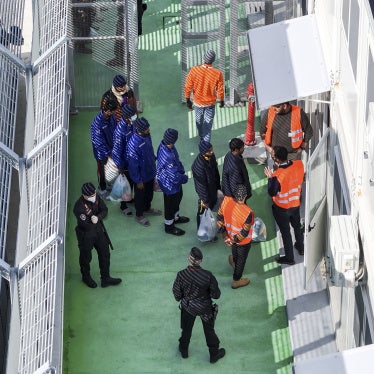(Paris) - The Law Commission should amend the text of the proposed immigration bill to protect all asylum seekers from the risk of being deported before their asylum claims have been fully examined, Action by Christians for the Abolition of Torture-France (ACAT-France), Human Rights Watch, and Amnesty International France said today. The debate on the bill is scheduled to begin in the National Assembly on September 15, 2010.
Amendments proposed by various members of parliament in the government majority party as well as the opposition would reform the so-called priority procedure to allow all asylum seekers to remain in France legally until a final decision is made in the case.
"Right now, thousands of asylum seekers are in danger of being sent back to their home countries before their claims have been fully examined," said Florence Boreil, asylum program officer at ACAT. "The Commission should take the immigration bill as an opportunity to prevent miscarriages of justice and protect asylum seekers against being sent back to countries where they may face persecution."
In 2009, more than 22 percent of all asylum seekers - 8,632 out of 38,803 - were considered under what is called the fast-track priority procedure, including re-examinations on the basis of new information. Under this procedure, the National Office for Refugees and Stateless Persons (OFPRA), a government entity, must decide on the application within 15 days, compared with an average of 114 days for the regular procedure.
While asylum seekers can appeal a negative decision to the independent National Court of Asylum, the final arbiter of asylum applications, the asylum seekers can be sent back to their country of origin at any time after the initial review. But since June 2007, the court has refused to consider appeals for asylum seekers who have been sent back to their home countries.
"A one-shot asylum system is unfair and dangerous," said Judith Sunderland, senior Europe researcher at Human Rights Watch. "Every year the asylum court grants protection to thousands of people who were initially rejected by the refugee office."
In 2009, the National Court of Asylum (CNDA) granted asylum to over 5,000 people who had been rejected by the National Office for the Protection of Refugees and Stateless Persons (OFPRA). While OFPRA's acceptance rate was 14.3 percent, the global acceptance rate after review by the court was 29.4 percent. This means that over 50 percent of protection decisions came from the CNDA in appeal procedures.
The right to an in-country appeal is a fundamental guarantee against returning a potential refugee to persecution, and the hallmark of a fair and credible asylum procedure. International human rights bodies have repeatedly maintained that the potentially serious and irreparable consequences of a wrong decision at first instance require providing asylum seekers the right to protection against return to their home country until their appeal for protection has been fully considered.
"An asylum procedure is supposed to protect people against the risk of persecution," said Jean-François Dubost, refugee and migrants program officer at Amnesty International-France. "But the priority procedure in France does the exact opposite: it institutionalizes this risk by denying people an effective remedy before a specialized judge."
Background :
- Under the priority procedure, asylum seekers are only allowed to remain on French territory until the Refugee Office makes a decision. They are not given a temporary residency permit, nor do they have the right to welfare and lodging assistance, as do other asylum seekers. The lack of assistance can have a negative impact on their ability to pursue their asylum claim effectively.
- The priority procedure, in place since the early 1990s, is used for asylum seekers from countries France has placed on a list of "safe countries of origin," for those considered a threat to public order, and for those whose application is deemed fraudulent, abusive, or solely intended to prevent implementation of a removal order.
- The procedure is also often used when rejected asylum seekers ask the Refugee Office to re-examine their claims on the basis of new information. Individuals who apply for asylum while in detention pending deportation are also considered under the priority procedure.
- The United Nations High Commissioner for Refugees, the European Commissioner for Human Rights, and the United Nations Human Rights Committee have expressed concern about France's priority procedure and have recommended that all asylum seekers have the right to an in-country appeal. Following its review of France in May 2010, the UN Committee against Torture said it was "concerned at reports that 22 percent of asylum applications submitted in 2009 were dealt with under the so-called priority procedure, which does not allow for an appeal with suspensive effect...the Committee is not convinced that the priority procedure offers adequate safeguards against removal where there is a risk of torture."







